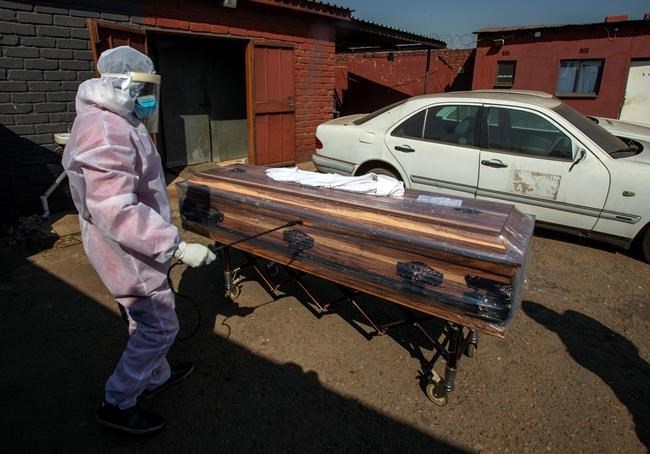
FILE - In this July 21, 2020 file photo, a funeral home worker in protective suits disinfects the coffin of a woman who died from COVID-19 before a funeral in Katlehong, near Johannesburg, South Africa. A South African funeral is usually an elaborate affair, often held on a Saturday, with family members and other mourners traveling from around the country, holding overnight vigils and washing the body. These days COVID-19 burials have to be held within four days, in the absence of relatives and friends and mourners being limited to fifty. (AP Photo/Themba Hadebe, File)
August 31, 2020 - 1:06 AM
JOHANNESBURG - When Khumbulani Moyo heard that his daughter had died of pneumonia while he was away on a work trip, he was shattered.
Then he faced South Africa’s new reality: His beloved 22-year-old Siphesihle Sithole would have to be buried within four days, in the absence of relatives beyond her parents. Traditional burial practices were set aside.
The COVID-19 pandemic has brought layers of pain to the country, claiming more than 14,000 lives and the rituals to mourn them.
A South African funeral is usually an elaborate affair, often held on Saturday and last through Sunday, with family members and other mourners travelling from around the country, holding overnight vigils and washing the body.
“A seed is fallen to the ground,” a popular mourning hymn goes, the single phrase repeated until the end.
Hundreds of people can attend the funerals — and some still do despite the government’s new restrictions limiting mourners to 50.
Some of those funerals have been blamed as super-spreading events for the coronavirus. Earlier this year, officials in Eastern Cape province identified 200 cases linked to two funerals in the cities of Port Elizabeth and Port St. Johns.
Even South Africa’s leaders have broken the rules. At the state funeral of prominent anti-apartheid activist Andrew Mlangeni, who decades ago was sentenced to prison with Nelson Mandela, ruling party members were criticized for failing to observe social distancing as they crowded around the casket.
Burying his daughter was a difficult experience, Moyo told The Associated Press. Relatives in neighbouring Zimbabwe and even elsewhere in South Africa could not attend, as travel between the provinces was prohibited.
And the body was not handed over the day before the funeral, as per tradition, to allow mourners to gather at the family home. Instead, the body now must be taken directly from the mortuary to the gravesite or crematorium.
As an alternative, some undertakers agree to drive the hearse by the home of the deceased on the way to the grave.
Tagu Sibeko, operations manager at Maziya Funerals in the township of Katlehong east of Johannesburg, said the ritual that has been most disrupted by the new regulations is the washing of the body by the family before burial.
“In African tradition, the family would come and wash the body, we would then coffin the body and on Friday we would deliver the body to the family. It would stay there until Saturday when the funeral happens. That has completely changed.
“With COVID-19, the body already leaves the hospital already put in three or four body bags, which are not supposed to be opened,” Sibeko said.
Because of the surge in deaths, families can no longer choose when to have the burial.
“We have never been this busy before,” Sibeko said. “Normally we bury on Saturdays and Sundays, but that has completely changed because now we bury every single day.”
He worries about being infected himself.
Some coffins of COVID-19 victims are now affixed with yellow stickers with a biohazard symbol and the words “Highly Contagious.”
The CEO of Avbob funeral insurance company, Carl van der Riet, said the government regulations are making what was already a traumatic experience even worse. The company manages funeral payment plans for millions of South Africans and produces coffins and caskets.
“Clients, and sometimes families, process trauma and grief in different ways,” he said. Now the company’s agents have the difficult task of telling families that some of those practices are no longer allowed.
One informal tradition around South African funerals is a casual gathering after the burial at the home of the deceased, known as an “after tears.” Earlier in the country’s lockdown, police arrested people in the capital, Pretoria, who hosted an “after tears” gathering.
People found guilty of breaking the regulations face a fine or imprisonment of up to six months.
As South Africa continues to gradually ease lockdown regulations, many hope that such rituals will be allowed again.
News from © The Associated Press, 2020